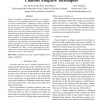Free Online Productivity Tools
i2Speak
i2Symbol
i2OCR
iTex2Img
iWeb2Print
iWeb2Shot
i2Type
iPdf2Split
iPdf2Merge
i2Bopomofo
i2Arabic
i2Style
i2Image
i2PDF
iLatex2Rtf
Sci2ools
ICWN
2003
2003
A Framework for Evaluating Effects of Channel Prediction Inaccuracy on the Performance of Channel Adaptive Techniques
—Adapting transmission parameters to the future channel state is an appealing approach to improve efficiency in wireless communication. Adaptation requires predicting the channel state. Current channel-adaptive techniques assume perfect prediction. In this paper, we claim that neglecting the prediction error leads to poor performance results, possibly even worse than without prediction at all. We have developed a simulation framework which allows us to investigate the effects of the prediction error on achieved performance results (e. g., throughput) independently of the prediction algorithm by introducing models for the prediction error. Furthermore, the simulation environment offers flexible interfaces which allow to replace components of the simulation model, like traffic generator, prediction model, channel model. To substantiate our claim, we have investigated the performance of two channel-adaptive schedulers, showing that the prediction error has to be considered.
Related Content
| Added | 31 Oct 2010 |
| Updated | 31 Oct 2010 |
| Type | Conference |
| Year | 2003 |
| Where | ICWN |
| Authors | Ana Aguiar, Holger Karl, Adam Wolisz, Horst Miesmer |
Comments (0)

